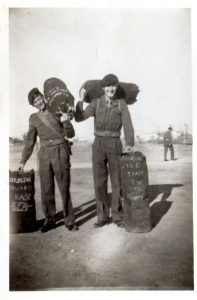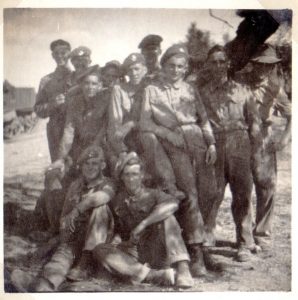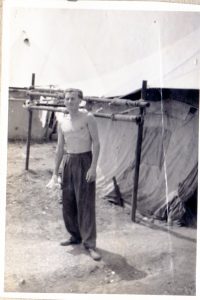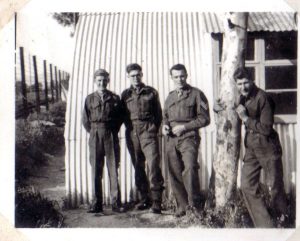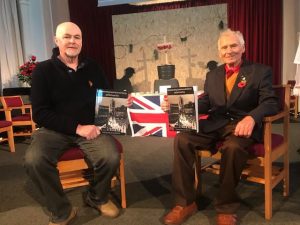.
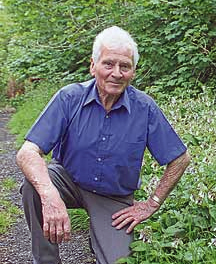
Born Dennis James Edwards in the Royal Salop Infirmary, Shrewsbury, early morning and several weeks before time, on the 7th February 1931, spent several weeks in incubators in the old hospital at the top of the town.
The second child of David John Edwards and Nancy (nee Scholtock) my first home was at Bellaport, near Market Drayton, Shropshire, but father being then a farm worker was offered a job near to Childs Ercall, nearer to a school for us and within easy reach of Market Drayton, our nearest market.
Father often changed bosses, because of his expert working of farm horses in all conditions, especially in ploughing where he gained several honours at local agricultural shows.
At ten years of age Father moved to a farm near Shawbury aerodrome, which after WW1 became the British Empire School of Aviation, and during WW2 was a base for training on every type of aircraft used around the thirties and forties, including the American Air Force as well as the Commonwealth countries. My school was within forty yards of one corner of the ‘drome, next to the ruins of a William 1st, Castle.
I quickly learned one type from another, especially when, with a farmworker we went around the surrounding fields, used as parking for aircraft, to find and check up on cattle and sheep grazing therein. Many of the animals would shelter beneath the aircraft and we often walked under the ‘planes to get to them.
My next school was the ‘big school’ when I was eleven, and moved to a Senior School in Wem, famous for the old-time Judge Jeffries of ‘hang them in the morning and try them in the afternoon’ fame. During the war, we were often taken out of school to help farmers save crops in spring and autumn and quite often in winter, too. We boys and some girls too missed a lot of lessons.
Leaving school at 14 years, I began part-time work on local farms, from spreading manure with a fork to pulling sugar beet and mangolds, and loading them for the factory or farmyard. From this, I progressed to threshing machines during spring and winter, and cutting grass and cereals during the rest of the time.
Getting fed up with spending all my time working, I met an older man who said if I went to a certain place I could get a job with a big building firm and get a much bigger return for my time.
I then took a job with the engineering firm of Farr Brothers of Bristol, who were building two bridges nearby for the S & M Railway, one over the River Severn into Wales, and the other over a small stream near to Kinnerly Station, much nearer to home. I was quickly put on to the machinery working side of the jobs, taking training on Drag-Lines, Cranes, Dumpers and a petrol-engined narrow-gauge railway train, used as a dumper to remove the soil from a new cutting for the base of the new bridge and to make the existing embankment wider to meet with the new bridge on the English side. I also had the job of accompanying the Railway Engineer and the firm’s Surveyor to put in the posts etc, to mark out all the measurements needed to build the new line and bridge.
When I reached 18 years, I received my calling up papers for the National Service. After showing them to my foreman, I was called into the office to see the boss, Mr Farr, himself, who said he did not wish to stop me from joining up if I wished, but also informed me that the firm had a multi-million pound engineering job to do in Ireland beginning in March of 1949, and I could be taken on there, with the promise of annual visits home free. After some thinking, I said I would rather do my time in the army and get it over with. Mr Farr said he thought that fine, but would hold a place for me after I had served my time should I wish to return to his employ.
Called up for 18 months service on 5th May 1949, draft number 2909, service number 22135244. Training with Light Infantry Training Battalion at Borden Barracks. Equipped for the King’s Own Yorkshire Light Infantry in Malaya for jungle warfare, but en-route drafted to Hong Kong from Singapore to the Kings Shropshire Light Infantry in the New Territories, Hong Kong; joined A Company; became Brengun Carrier driver for Pioneer Platoon in Support Company. Korean War began, volunteered (with many others to join other regiments to go to Korea). Signed on for 3rd year and was returned to the UK to help train Somerset Light Infantry 1st Regt. – then at Dover Castle – in order for them to join B.A.O.R, in Germany. When Prince Albert’s Own was posted to Germany, I was posted to the D.C.L.I., at Kiwi Barracks, near Salisbury, to complete 3 years service, and enter the Territorial 4th Bn. KSLI.
In the spring of 1954, volunteered for the RASC hoping to be a driver of heavy vehicles, on a Nine Year by Three years scheme. Sent to the same barracks for training – persuaded to become a Clerk and drive typewriters (more pay) and passed typing test at 30 wpm. Given the S/ (Stores)to denote the difference from D/ for drivers. Due to the previous service was put to help the ‘awkward squad’ march, use weapons, etc. as well as office work. Surprisingly – passed all the tests. After training, a batch of us was sent to Fayid, on the shore of the Lakes, and I was put into the Staff Message Control office of GHQ MELF. After several weeks was put on shift work as a typist-clerk handling messages up to Top Secret, Personal For, etc. (Was secretly screened). General Nasser wanted control of all of Egypt and begged the British Government to please quit Egypt – and GHQ, in two parts, moved to Cyprus. I was sent to HQ in Nicosia to become L/Cpl on shift work of 12 hours on, 24 hours off. Became Corporal of shift A. (A Staff-Sergeant’s job). Passed educational tests 3 and 2, and made Sergeant of Shift A. Was kept back after the Suez Operation to allow Z Reservists to be de-mobbed, for two weeks, then returned to England to the original barracks. Sent on month’s leave, and retired, to do nine years on reserve with the rank of S/22135244 Edwards, DJ. Sergeant, with the stipulation I could not enter any Iron Curtain country.
A month afterwards, I applied for, and was accepted for a job at Headquarters, West Midlands Army HQ, in Shrewsbury, and was put in the message department. Squabbles took place when it was announced staff cuts were to be made. Due to my previous army service, I was the second senior of six people in the department which had to be cut by three so I left. I returned to contracting, this time on farming, threshing machines, combines (then quite new), baling, etc.
Then I was offered a job by a nearby wooden shed manufacturer. I went around Britain erecting hen houses, garages, garden sheds, turkey sheds for a well-known breeder, and many other types including a Wooden cedar Bungalow for an agent at Warbstow, in Cornwall. After several journeys into the west, met a young lady from Bridestowe, asked her to marry me (which she accepted) and I moved to the Launceston area on April 1st, 1963, setting up home in Egloskerry.
I took a job with roads and haulage contractor, Messers. Dingles & Sons, of Stoke Climsland, mainly drove road-rollers for the next 29 years, when the contractor retired, then joined other like companies for another 6 or so years before retiring at over 66 years of age.
After retirement, I took up enquiring into the history of the Southwest, especially of the great number of watermills I had passed (some examined as I passed by on my road roller). I soon realised that the number of mills would be in the hundreds, so finally decided to first find the number on the tiny river Kensey, about ten miles in length, and finding about twenty-two in number, including some of the oldest in Cornwall, Ridgegrove Mills having a history going back to King Ethelred.
In 1977 I received notice that the Iron Curtain ban had been lifted and I could obtain a British Passport. It was some years before I and my wife obtained passports and decided we could then take holidays overseas. First to Cyprus, because I wished to show my family (two girls) where I had spent some time in lovely weather.
Later, as the girls grew up, my wife and I got a bit adventurous and went to Canada, which we enjoyed so much we went several times and saw quite a lot of the great country, especially the western areas. We also took tours on the continent, Switzerland, several times, and parts of the Low Countries. On day tours, etc. Now I am satisfied to still examine the history of people and places and write some of it up. Meeting up with Roger Pyke, we have put together much of my research and his to form the Launceston Then website which now has over 690 pages. It is he who nicknamed me ‘The Oracle.’ In 2018 I co-wrote a book with Roger about Launceston and the First World War.
Some War Time Memories of school, etc.
3rd September, 1939 – Britain and France declared war on Germany. I was just 8.1/2 years old.
Living in Orange Hill Rd, Manchester. (Sent home to Shropshire when the bombing started.)
The Black-out: school, homes, factories, farms – all buildings, greenhouses, etc. on all windows, doorways, and every other type of opening: all vehicles, motor vehicles had masks on headlights with small slits to allow light only onto the road. No outside fires in the evenings.
Windows had to have strips of cloth/material pasted on to them to prevent splinters flying.
Schools were provided with air raid shelters, towns had shelters built in streets, under streets and buildings, cottages had them in the garden or nearby field. The Anderson shelter was made of lengths of galvanised iron. People, including schoolchildren, had to practise going into the shelters so that the doorways were not over-crowded in a rush.
Rationing was introduced for food, clothing, shoes, fuel, everything. Country people were not so badly affected as the townspeople as most kept chickens, pigs, goats or a cow, or had neighbours who did.
Children were given time off school for crop planting, saving, etc. We had to carry gas masks to school and work in a cardboard box with a string handle.
Animals were called up (requisitioned) for war work, as well as people of all trades and professions:
Horses – Dogs – Cats – Pigeons – Hawks.
The Home Guard was formed, we could see them at practice, also soldiers when they were stationed nearby. Father had his uniform and rifle hanging up in the back kitchen. (Touch it if you dare!)
Many airfields were built in quiet areas; low flying aircraft were everywhere.
We lived beneath a wooded hill, and from the top could watch aircraft taking off and landing at two airfields, watchmen jump out of gliders and slow aircraft and to join in ‘battle’ when they landed. If the wind came from a certain direction, we found parachutists in the moorland and even in the trees on the hill area.
Finding parachute silk was a great thrill for us.
We knew very little of the war in other parts. Talk of any movements of heavy vehicles or of new buildings, etc. was very strictly banned on threats of imprisonment.
Since working around Britain, and especially in the South-West, I have enjoyed working in many of the wartime airfields, naval establishments, Forces camps and barracks, British and Allies, and collected great knowledge of lots of them.
Davidstowe – Built for the American and Allied Coastal aircraft, along with the great string of bases up and down Cornwall and Devon Railways, Docks. Camps for refugees and forces members.
Later, huge stocks of fuel, tanks, weapons – were appearing beside main roads, in country lanes and fields. Often AA gun sites, balloon sites, detector sites, etc would appear as if from nowhere.
Jim Edwards. ( January 2019.)
Jim sadly passed away on the morning of November 30th, 2023 aged 92. A service was held at Bodmin Crematorium on December 29th, 2023 followed by a memorial celebration of his life at Launceston Football Club afterwards. Jim will be greatly missed, but this website stands as a lasting memorial to his tireless work over the years in researching Launceston’s history.
Visits: 129

